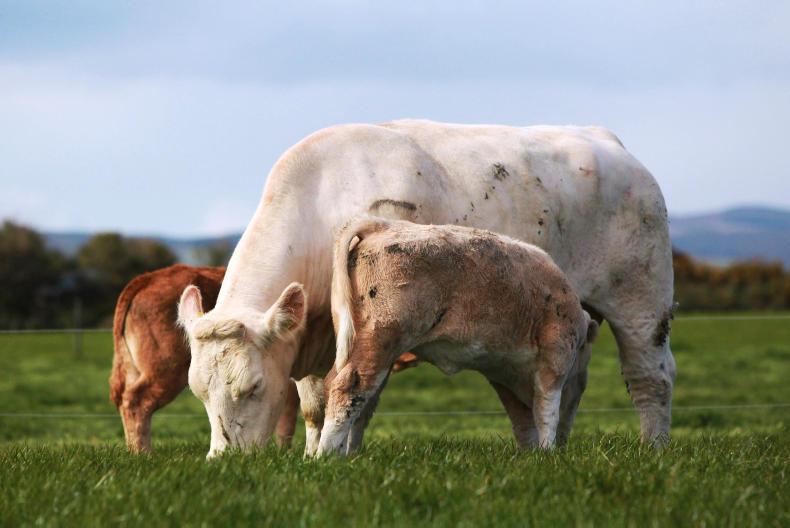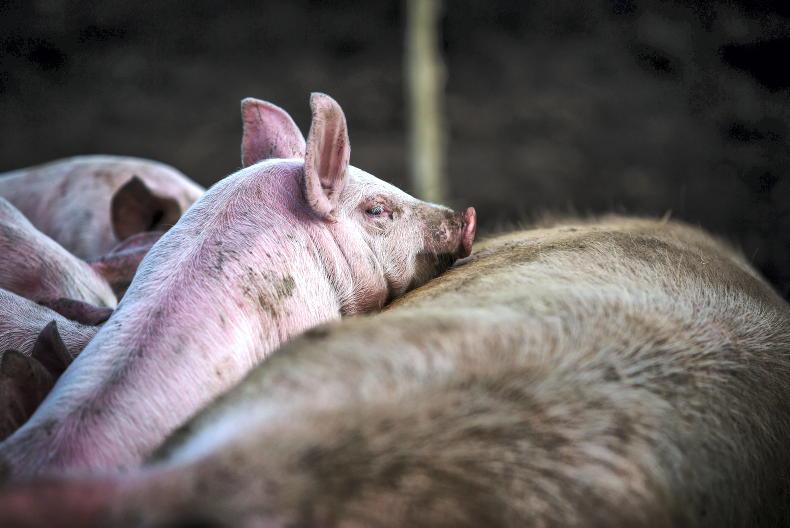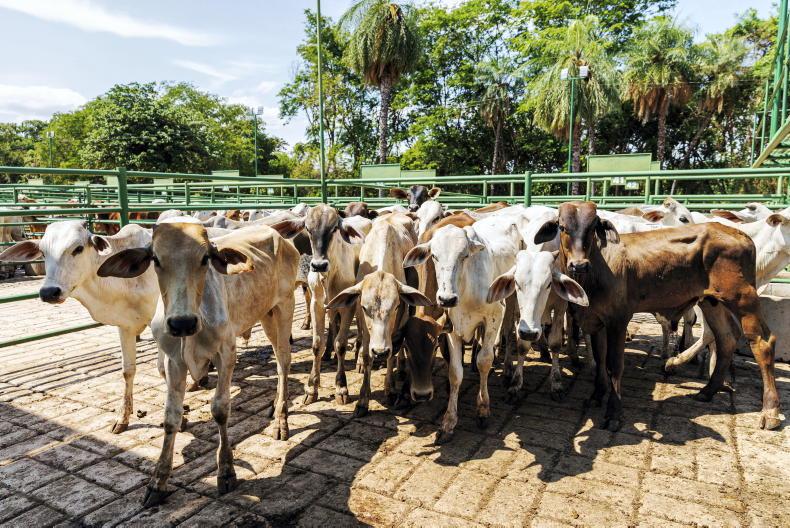The European Commission presented the conclusions of a simulation of future trade agreements to the Council of European Agriculture Ministers in Brussels this Tuesday.
Commission officials used economic models to evaluate the effect of proposed trade agreements with the US (TTIP), the Mercosur bloc of South American countries and 10 other partners by 2025.
They looked into two scenarios:
Conservative: full liberalisation of 97% of products and a 25% tariff cut for the others.Ambitious: full liberalisation of 98.5% of all products and a partial tariff cut of 50% for the others.Beef and sheep
The study found that the “beef and sheep sector is the most affected sector in terms of trade flows, imports in particular”. A jump in beef imports into Europe, 80% of which would come from Mercosur, would not be met with corresponding export increases. Under the most ambitious scenario, beef imports from Mercosur into the EU would skyrocket by 300%.
The additional volume of EU beef imports creates a direct downward pressure on the EU producer prices
The effect on European beef farmers would be devastating: “EU beef imports could increase by about 146,000t and 356,000t in the conservative and ambitious scenario, respectively,” the authors wrote. “The additional volume of EU beef imports creates a direct downward pressure on the EU producer prices. Moreover, the beef market is under additional pressure from the positive developments in dairy market induced by growing EU exports upon opening up the FTA partners’ markets.”
Beef prices would fall by 8% under the conservative scenario and 16% under the ambitious one. While consumers would eat more beef thanks to lower prices, production would still drop because of competition from cheap imports. “It is reasonable to assume that most of this production decrease will be even stronger in specialised beef production, while partly offset by an increase in production of meat originating from the expanding dairy herd,” the report adds.
Turkey is the only trading partner with whom an agreement would improve Europe’s beef and sheep trade balance.
Dairy
The balance of dairy trade could improve by up to €900m for Europe under the ambitious scenario, and over €800m under the conservative one. While Europe would import more dairy products from areas covered by new trade agreements, this would be more than compensated by a surge in cheese and skimmed milk powder exports to Turkey, Latin America and Japan.
Pig and poultry
While increasing trade liberalisation would benefit pig exports to Japan, the US, Canada, Mercosur and Australia, poultry imports from Mercosur would increase, leading to an overall neutral effect on the white meat sector.
Grain
The report found that the impact of trade deals on the grain sector would be limited because those markets are already largely liberalised. However, one of the caveats of the study is that it considers only tariff changes – not the effect of trade agreements on other trade barriers such as sanitary controls.
However, the ambitious scenario could lead to a slight rise in European grain exports and increased demand for feed in the pig and poultry sector, leading to a 3% rise in European prices, the study estimates.
While many sectors such as prepared foods are not covered by the study, it contains indications of positive impacts on beverages and other areas.
The European Commission pointed out that the models are simplified and based on assumptions; therefore, the study does not constitute a forecast.
Presenting the report, European Commissioner for Agriculture and Rural Development Phil Hogan said: “The effect of international trade agreements on agriculture and the European agri-food sector is broadly positive.” However, he added that “the study has emphasised in very potent terms that we have clear sensitivities in relation to beef and rice”. The Commission concluded that the study vindicated its approach of limiting import quotas for sensitive agricultural products when negotiating trade deals.
Minister for Agriculture Michael Creed said that “as a small open economy, Ireland supports trade liberalisation”. However, he stressed the need to keep trade agreements balanced to “serve both our offensive and defensive interests”. “The beef sector is no longer prepared to be the sweetener for trade deals, particulary with Mercosur, and we are the biggest exporter of beef in the northern hemisphere so we have particular skin in the game,” Minister Creed said in Brussels.
IFA livestock chair Angus Woods called on Commissioner Hogan to “use the stark findings in the report to redouble his efforts against trade deals that would be bad for beef and Irish and EU agriculture”. By his calculation, a 15% drop in beef prices would cost Irish farmers €350m. “Individual negotiations must take account of the cumulative impact of any previous concessions on market access that have been given in the beef sector,” Woods said, calling for limited tariff-rate quotas and retained tariffs for beef in future trade negotiations.
Cormac Healy, director of Meat Iindustry Ireland, said that "the impact assessment clearly justifies the sensitive product status of beef and sheepmeat in the context of EU trade negotiations and highlights the serious negative impact of an EU-Mercosur trade deal, in particular, for the EU beef sector and especially for suckler beef production." Healy said Ireland should stand firm against unreasonable trade deals and added: "If there is a negative impact on the EU beef market, the Irish beef sector, as a major exporter within the European market, will be the first and most deeply affected."
Read more
Download the European Commission report
Editorial: informing trade debate with stark facts
Brussels insight: Canada deal – signed and sealed, but will it be delivered?
The European Commission presented the conclusions of a simulation of future trade agreements to the Council of European Agriculture Ministers in Brussels this Tuesday.
Commission officials used economic models to evaluate the effect of proposed trade agreements with the US (TTIP), the Mercosur bloc of South American countries and 10 other partners by 2025.
They looked into two scenarios:
Conservative: full liberalisation of 97% of products and a 25% tariff cut for the others.Ambitious: full liberalisation of 98.5% of all products and a partial tariff cut of 50% for the others.Beef and sheep
The study found that the “beef and sheep sector is the most affected sector in terms of trade flows, imports in particular”. A jump in beef imports into Europe, 80% of which would come from Mercosur, would not be met with corresponding export increases. Under the most ambitious scenario, beef imports from Mercosur into the EU would skyrocket by 300%.
The additional volume of EU beef imports creates a direct downward pressure on the EU producer prices
The effect on European beef farmers would be devastating: “EU beef imports could increase by about 146,000t and 356,000t in the conservative and ambitious scenario, respectively,” the authors wrote. “The additional volume of EU beef imports creates a direct downward pressure on the EU producer prices. Moreover, the beef market is under additional pressure from the positive developments in dairy market induced by growing EU exports upon opening up the FTA partners’ markets.”
Beef prices would fall by 8% under the conservative scenario and 16% under the ambitious one. While consumers would eat more beef thanks to lower prices, production would still drop because of competition from cheap imports. “It is reasonable to assume that most of this production decrease will be even stronger in specialised beef production, while partly offset by an increase in production of meat originating from the expanding dairy herd,” the report adds.
Turkey is the only trading partner with whom an agreement would improve Europe’s beef and sheep trade balance.
Dairy
The balance of dairy trade could improve by up to €900m for Europe under the ambitious scenario, and over €800m under the conservative one. While Europe would import more dairy products from areas covered by new trade agreements, this would be more than compensated by a surge in cheese and skimmed milk powder exports to Turkey, Latin America and Japan.
Pig and poultry
While increasing trade liberalisation would benefit pig exports to Japan, the US, Canada, Mercosur and Australia, poultry imports from Mercosur would increase, leading to an overall neutral effect on the white meat sector.
Grain
The report found that the impact of trade deals on the grain sector would be limited because those markets are already largely liberalised. However, one of the caveats of the study is that it considers only tariff changes – not the effect of trade agreements on other trade barriers such as sanitary controls.
However, the ambitious scenario could lead to a slight rise in European grain exports and increased demand for feed in the pig and poultry sector, leading to a 3% rise in European prices, the study estimates.
While many sectors such as prepared foods are not covered by the study, it contains indications of positive impacts on beverages and other areas.
The European Commission pointed out that the models are simplified and based on assumptions; therefore, the study does not constitute a forecast.
Presenting the report, European Commissioner for Agriculture and Rural Development Phil Hogan said: “The effect of international trade agreements on agriculture and the European agri-food sector is broadly positive.” However, he added that “the study has emphasised in very potent terms that we have clear sensitivities in relation to beef and rice”. The Commission concluded that the study vindicated its approach of limiting import quotas for sensitive agricultural products when negotiating trade deals.
Minister for Agriculture Michael Creed said that “as a small open economy, Ireland supports trade liberalisation”. However, he stressed the need to keep trade agreements balanced to “serve both our offensive and defensive interests”. “The beef sector is no longer prepared to be the sweetener for trade deals, particulary with Mercosur, and we are the biggest exporter of beef in the northern hemisphere so we have particular skin in the game,” Minister Creed said in Brussels.
IFA livestock chair Angus Woods called on Commissioner Hogan to “use the stark findings in the report to redouble his efforts against trade deals that would be bad for beef and Irish and EU agriculture”. By his calculation, a 15% drop in beef prices would cost Irish farmers €350m. “Individual negotiations must take account of the cumulative impact of any previous concessions on market access that have been given in the beef sector,” Woods said, calling for limited tariff-rate quotas and retained tariffs for beef in future trade negotiations.
Cormac Healy, director of Meat Iindustry Ireland, said that "the impact assessment clearly justifies the sensitive product status of beef and sheepmeat in the context of EU trade negotiations and highlights the serious negative impact of an EU-Mercosur trade deal, in particular, for the EU beef sector and especially for suckler beef production." Healy said Ireland should stand firm against unreasonable trade deals and added: "If there is a negative impact on the EU beef market, the Irish beef sector, as a major exporter within the European market, will be the first and most deeply affected."
Read more
Download the European Commission report
Editorial: informing trade debate with stark facts
Brussels insight: Canada deal – signed and sealed, but will it be delivered?









SHARING OPTIONS